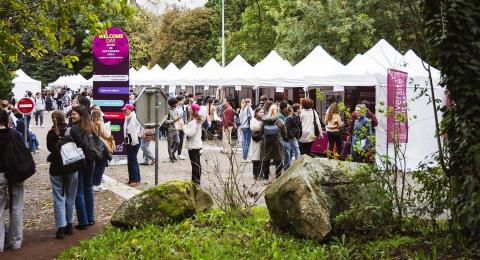Biodiversity, Ecology, Evolution
The Biodiversity Ecology and Evolution degree at the Université Paris-Saclay covers a wide range of disciplines concerning the management and understanding of biodiversity in relation to the environment.
The BEE program consists of a Master's degree (M1) that allows students to acquire all the fundamentals of ecology/evolution, using approaches that include field observations, laboratory analyses, and modeling. The M1 program leads to six Master's degrees (M2) allowing students to specialize in a specific area of ecology.
• Conservation Ecology, Ecological Engineering: Research and Expertise (ECIRE)
• Evolutionary and Functional Ecology (EVEF)
• Landscape Ecological Approach (AEP) (apprenticeship)
• Chemical Pollution and Environmental Management (PCGE)
• Higher Education Training in Life Sciences (Preparation for the SV-STU agrégation) (Preparatory Agregation)
• Evolution of Genomes, Populations, and Species: Data and Models (EVOGEM)
At the same time, some students may choose to pursue a Magistere which will allow them to obtain a dual degree at the end of the Master's degree: a Master's degree in BEE and a Magistere in Biology.
Information
Master’s Year 1
Master’s Year 2
Skills
The first year of M1, entitled M1 Ecology, allows students to acquire all the fundamentals in evolutionary ecology, functional ecology, modeling but also field ecology (introduction to ecological diagnosis and the construction of management plans). Students must also follow a teaching unit to raise awareness of major environmental issues led by the GS Biosphera (Major Challenges for the Environment, series of conferences) covering cross-cutting themes of environmental management, biodiversity, environmental economics and law, agriculture, nutrition, etc. The second semester allows students to deepen their skills in different fields of ecology (functional ecology, conservation ecology, population dynamics/evolution, ecological engineering) or different types of ecosystems (marine ecology, soil ecology, etc.), thanks in particular to numerous teaching units combining theory and field studies. The second year of the BEE specialization is divided into 6 specialized courses in the different fields of biodiversity management and understanding at all its scales, from the gene to the biosphere (EVEF, ECIRE, AEP, EVOGem), but also pollution management (PCGE). The EVEF and EVOGem courses train more specifically for research careers, while the ECIRE, AEP and PCGE courses train for both research and expert careers. One of the courses prepares more specifically for the national education recruitment competition for the agrégation in Life Sciences, Earth Sciences and the Universe.
Learning outcome targets
This training offers to acquire a very good knowledge of ecology, evolution and functioning of living things in interaction with their environment from the individual scale to that of the ecosystem or the biosphere. A societal dimension is also addressed, through the human-nature interface, the planning and governance of territories. The scientific objectives include mastery of theories and concepts on biodiversity, in evolutionary and functional ecology, as well as that of approaches in modeling, experimentation, field monitoring, and quantitative methods in data analysis at the different levels of integration: genes, individuals, populations, communities, ecosystems, territories. The second year of the BEE mention will be divided into 6 specialized courses in the different fields of management and understanding of biodiversity at all its scales, from the gene to the biosphere (EVEF, ECIRE, AEP, EVOGem), but also pollution management (PCGE). One of the tracks specifically prepares for the competitive entrance exam for the French National Education system (Agrégation) in Life Sciences, Earth Sciences, and the Universe.
Target audience
Students joining the M1 Ecology program with a BEE specialization must have taken courses in ecology and evolution, as well as biostatistics, during their studies. Some of them come from the L3 Biology of Organisms and Ecology program at Paris Saclay University. However, the M1 BEE also includes students from other Life and Earth Sciences programs at other French universities, with French bachelor's degrees (e.g., Bachelor's in Naturalist Management and Valorization) and foreign ones. Finally, each year, the M1 BEE welcomes students in career change from various backgrounds but with a strong scientific background. A refresher course in ecology through various books is offered to them at the beginning of the M1 year. In M2, the ECIRE and EVEF courses are also open to Agroparistech engineering students who wish to specialize in ecology for their third year of the engineering program. The M2 AEP is offered to students with a background in architecture/landscape design. The M2 EVOGem and PCGE welcome students from the BEE Saclay master's degree, as well as from other courses at Paris Saclay University or national and international courses.








